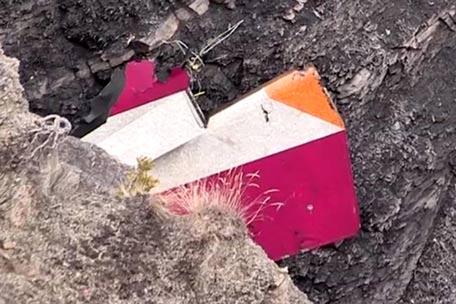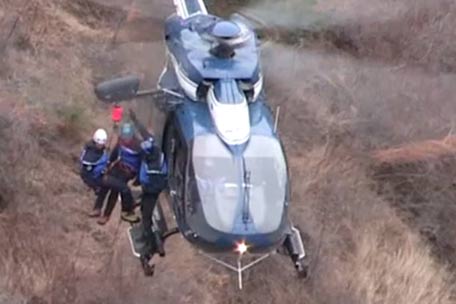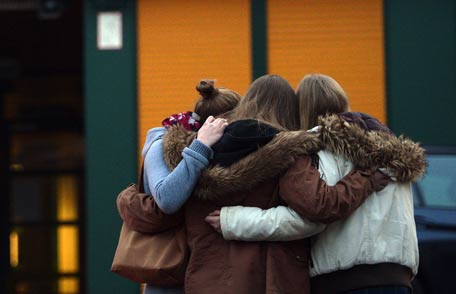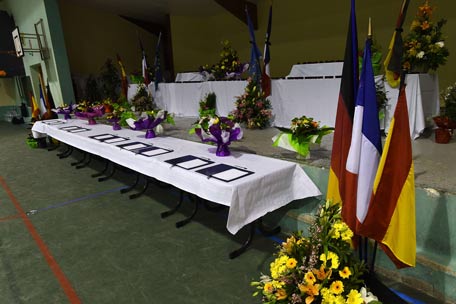The young co-pilot of the doomed Germanwings flight appears to have ‘deliberately’ crashed the plane into the French Alps after locking his captain out of the cockpit, but is not believed to be part of a terrorist plot, French officials said on Thursday.
In a chilling account of the last minutes of Germanwings Flight 4U 9525, lead prosecutor Brice Robin said 28-year-old German Andreas Lubitz ‘deliberately’ initiated the plane's descent while alone at the controls.
Lubitz appeared to ‘show a desire to want to destroy’ the plane, Robin told reporters, basing his initial findings on recordings made by the Airbus' cockpit flight recorder in the final minutes before the crash that killed all 150 passengers and crew on board.
Robin said the 144 passengers died ‘instantly’ and probably were not aware until the ‘very last moment’ of the impending disaster.
"The screams are heard only in the last moments before the impact," said the prosecutor.
"The co-pilot was alone at the controls," he said. "He ... refused to open the door of the cockpit to the pilot."
The pilot, believed to have gone to the toilet, made increasingly furious attempts to re-enter the cockpit, banging on the door, the recordings show.
There was no immediate clue as to the motive of the co-pilot, but investigators appeared to rule out terrorism.
"At this moment, there is no indication that this is an act of terrorism," Robin said, adding that Lubitz had no known terrorist connection.
Germany's interior minister echoed this, saying there was so far no indication of ‘a terrorist background.’
However, Robin also said he was unwilling to use the word ‘suicide’ and could not guess at Lubitz's motive.
"Usually when you commit suicide, you do it alone. When you're responsible for 150 people, I don't call that a suicide," he said.
The co-pilot, who deliberately set the controls ‘to accelerate the plane's descent’ into the side of a mountain in a region famous for its ski resorts, ‘was conscious until the moment of impact,’ Robin said.
"This action can only be deliberate. It would be impossible to turn the button by mistake. If you passed out and leaned over on it, it would only go a quarter-turn and do nothing," he stressed.
"He didn't reply to a thing. He didn't say a word. In the cockpit, it was utter silence."
'Deeply shaken'
Lufthansa chief executive Carsten Spohr said he was ‘stunned’ by the revelations and had ‘no indication’ on the motives of Lubitz.
He added that no security system in the world could have prevented the co-pilot's actions.
Spohr said Lubitz had passed all psychological tests required for training and underwent regular physical examinations.
The shocking new information was released as families and friends of victims were travelling to the remote mountainous crash site area, where locals have opened their doors in a show of solidarity with the grieving relatives.
Two planes arrived in southern France on Thursday from Barcelona and Duesseldorf with families and friends.
Tents were set up for them near the crash site area to give DNA samples to start the process of identifying the bodies of loved ones, at least 51 of whom were Spaniards and at least 72 Germans.
"We're all pitching in of course. There's no such thing as nationality, no such thing as religion," said one local volunteer, Charles Lanta.
Meanwhile, the remains of victims, found scattered across the scree-covered slopes, were being taken by helicopter to nearby Seyne-les-Alpes, a source close to the investigation told AFP.
A mountain guide who got near the crash site said he was unable to make out recognisable body parts.
"It's incredible. An Airbus is enormous. When you arrive and there's nothing there... it's very shocking," said the guide, who did not wish to be identified.
The crash site, which is situated at about 1,500 metres (5,000 feet) altitude, is accessible only by helicopter or an arduous hike on foot.
French President Francois Hollande and German Chancellor Angela Merkel flew over the site to see the devastation for themselves Wednesday. Spain's Prime Minister Mariano Rajoy also visited a crisis centre near the scene.
Rajoy said he was ‘deeply shaken’ by the prosecutor's findings.
It was the deadliest air crash on the French mainland since 1974 when a Turkish Airlines plane crashed, killing 346 people.
Lufthansa said the aircraft was carrying citizens of 18 countries. Three Americans and three Britons were confirmed among the victims.
Argentina, Australia, Belgium, Colombia, Denmark, Holland, Israel, Japan, Mexico and Morocco also had nationals on board, according to officials.
The dead on board flight 4U 9525 included two babies and 16 German school exchange pupils. They were flying from Barcelona to Duesseldorf.
A second black box, which records flight data, has not yet been recovered.
Final minutes of doomed flight
The flight started like any other, the conversation in the cockpit perfectly normal, with co-pilot Andreas Lubitz offering no indication of the horror he would soon allegedly inflict on the other 149 people on board flight 4U 9525.
"For the first 20 minutes, they spoke in a normal fashion, courteous, like normal pilots. There was nothing abnormal," French prosecutor Brice Robin told reporters on Thursday.
He was relaying information from the cockpit voice recorder, captured by one of the ‘black boxes’ discovered among the debris of the Airbus A320 that crashed into the French Alps on Tuesday.
The plane had taken off from Barcelona around 10am local time, heading for Duesseldorf in Germany.
When the plane reached cruising altitude and been placed on auto-pilot, Lubitz and the other pilot, who has yet to be named, began discussing the landing in Duesseldorf.
The responses from Lubitz remained normal, but "very short... not a real dialogue," Robin said.
"Then we hear the pilot ask the co-pilot to take the controls and we hear the sound of a seat being pulled back and a door closing. We can assume he left to answer nature's call."
Once left alone, Lubitz turned a button on the flight monitoring system that began the plane's descent.
"This action can only be deliberate," Robin said. "It would be impossible to turn the button by mistake. If you passed out and leaned over on it, it would only go a quarter-way and do nothing."
The pilot returned from the toilet and tried to open the cockpit door, which is heavily reinforced to prevent hijackings and requires a code.
He may not have known the code, although Lufthansa chief Carsten Spohr said this was unlikely.
More probable, officials said, is that Lubitz deliberately locked the door from the inside, making it impossible for anyone to enter.
"The most plausible interpretation is that the co-pilot deliberately refused to open the cockpit door to the pilot," Roin said.
The black box then records increasingly frantic attempts by the pilot to break down the door, to which Lubitz makes no response.
'Total silence'
For the eight minutes after he began the descent, Lubitz was apparently calm and silent, breathing normally and showing no sign of panic.
"He does not say a single word. Total silence," Robin said.
The descent started over the town of Toulons in southern France, triggering concern from air traffic controllers who repeatedly tried to contact the plane.
As alerts came in on the fall in altitude and other changes, there was no response and no distress message from the plane.
Desperate ground controllers even asked nearby planes to try to make contact, but they, too, were unsuccessful.
The plane dropped gradually from around 10-12,000 metres (30,000 feet) to 2,000 m -- slowly enough, Robin said, that passengers would have been unaware anything was wrong.
"I think the victims were only aware at the very last moment. The screams are heard only in the last instants before the impact," said Robin.
The first sign of trouble would have come when alarms were automatically set off to indicate the plane was dangerously close to the ground.
Within moments, the plane had slammed into a mountainside at a speed of 700km per hour, Robin added.
Lubitz's motives remain entirely unknown.
Nor do the investigators know what would have happened if the pilot had not gone to the toilet.
"I'm not in the head of this co-pilot. Normally when we commit suicide, we do it alone. When you're responsible for 150 people behind, I don't necessarily call that suicide," Robin said.
EARLIER REPORT
Pilot of ill-fated plane locked out of cockpit
A pilot of the plane that crashed in the French Alps killing all 150 on board left the cockpit before the fateful descent and was left trying to smash the door down but still failed to get back in, a report said Wednesday.
The New York Times cited a senior military official involved in the investigation who had heard the cockpit voice recorder.
The official was quoted as saying that there was a 'very smooth, very cool' conversation between the two pilots during the early part of the doomed flight from Barcelona to Dusseldorf on Tuesday.
Then the audio indicated that one of the pilots left the cockpit and could not re-enter, the investigator said.
"The guy outside is knocking lightly on the door and there is no answer," the investigator told the newspaper. "And then he hits the door stronger and no answer. There is never an answer.
"You can hear he is trying to smash the door down."
The official, who requested anonymity because the investigation is continuing, told The New York Times: "We don't know yet the reason why one of the guys went out.
"But what is sure is that at the very end of the flight, the other pilot is alone, and does not open the door."
Football team escapes death... 16 students do not
A Swedish third division football team booked on the doomed Germanwings flight that crashed Tuesday in the French Alps escaped death by changing flights at the last minute, the team said.
The Dalkurd FF team from Borlaenge, in central Sweden, was booked to fly home to Sweden on the budget carrier after a trip to Catalonia.
The Airbus A320, carrying 144 passengers and six crew from Barcelona to Duesseldorf, crashed in mountainous terrain in southeastern France killing all 150 on board.
 Part of the vertical stabilizer of the Germanwings Airbus A320 at the crash site in the French Alps above the southeastern town of Seyne. (AFP)
Part of the vertical stabilizer of the Germanwings Airbus A320 at the crash site in the French Alps above the southeastern town of Seyne. (AFP)
But upon arrival at Barcelona airport, the team decided the layover in Duesseldorf would be too long so they re-booked themselves onto three other flights flying via Zurich and Munich.
"To all those who have tried to contact us in the past few hours we are home and we are fine. It was another plane. May they rest in peace," goalkeeper Frank Pettersson wrote on Twitter.
Sporting director Adil Kizil told daily Aftonbladet the team had a very close call.
"We were supposed to be on that plane."
 Search and rescue personnel being lowered close to the crash site of the Germanwings Airbus A320 that crashed in the French Alps above the southeastern town of Seyne. (AFP)
Search and rescue personnel being lowered close to the crash site of the Germanwings Airbus A320 that crashed in the French Alps above the southeastern town of Seyne. (AFP)
"There were four planes that left around the same time and that flew north over the Alps. Four planes and we had players on three of them. You can say we were very, very lucky," he said.
Dalkurd FF is the Kurdish community's club in Sweden, and is followed by supporters from the Kurdish diaspora around the world.
The dead are believed to include Germans, Spaniards, probably Turks, and at least one Belgian national.
Students, teachers weep for classmates on doomed plane
Students and teachers at a small-town German high school broke down in tears once they realised that 16 classmates and two teachers were onboard an ill-fated Germanwings airplane that crashed in France on Tuesday on a flight to Duesseldorf.
The 10th grade students from the Joseph-Koenig-Gymnasium high school were on their way home after a week-long Spanish exchange programme at the Institut Giola in Llinars del Vallèsnear Barcelona. It was a reciprocal visit after 12 Spanish students had spent a week at their school in December.
 Students gather at a memorial of flowers and candles in front of the Joseph-Koenig-Gymnasium secondary school in Haltern am See, western Germany. (AFP)
Students gather at a memorial of flowers and candles in front of the Joseph-Koenig-Gymnasium secondary school in Haltern am See, western Germany. (AFP)
"It was a Spanish language exchange programme and they were flying home after having what was probably the most wonderful time of their lives," said Sylvia Loehrmann, the education minister for the state of North Rhine-Westphalia.
"It's so tragic, so sad, so unfathomable," she said. Most of the students were about 15 years old.
The Airbus operated by Lufthansa's Germanwings budget airline crashed in the French Alps, killing all 150 on board.
Germanwings confirmed its flight from Barcelona to Duesseldorfwent down with 144 passengers and six crew.
Haltern am See mayor Bodo Klimpel said that word spread quickly through the school about reports that a plane from Barcelona had gone missing and the students began researching on their own to try to find out more about the plane's fate.
"And then when the plane didn't land and they were unable to make contact with their friends and classmates by cell phone, that's when they assumed the worst had happened," said the mayor, who was also fighting off tears at a news conference.
The students were informed that there was a sufficient probability that the plane would not be landing in Duesseldorf,"Klimpel said. "Classes were then called off."
 Condolence books are seen in a sports hall in the southeastern French town of Seyne, near the site where a German Airbus A320 of the low-cost carrier Germanwings crashed, killing all 150 people on board. (AFP)
Condolence books are seen in a sports hall in the southeastern French town of Seyne, near the site where a German Airbus A320 of the low-cost carrier Germanwings crashed, killing all 150 people on board. (AFP)
The town lies about 30 km (20 miles) to the north of Dortmund and Gelsenkirchen - homes of two major German soccer clubs and former mining towns. It is 50 km (30 miles) north of Duesseldorf.
Haltern am See's history dates back to 1289 and perhaps its most famous son in soccer player Christoph Metzelder, a former Germany defender who also played for Borussia Dortmund and Real Madrid.
Germany defender Benedikt Hoewedes, who plays for Gelsenkirchen's Schalke 04 club, is also from Haltern am See.
The nearby Sixtus church and another local church opened their doors for students, teachers and local residents to mourn and flags in the town of 37,000 that lies just north of the Ruhr River Valley industrial area were lowered to half-mast.
The mayor of the Spanish town Llinars del Valles, MartiPujol, told Reuters that these kinds of exchanges had been organised for several years with German towns including in the Duesseldorf, Cologne and Hamburg areas. Spanish children had spent a week in December in Haltern am See with German families.
"The whole village is distraught, Pujol said of his town with 9,000 residents. "The families knew each other... The parents had been to see them off at 6 this morning."